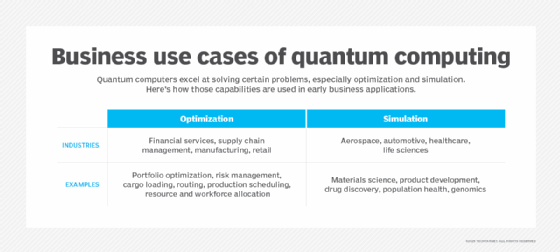The potential business opportunities in quantum computing
Optimization use cases in areas like supply chain, resource allocation, routing and production scheduling are leading the near-term commercial application of quantum computing.
While still in its early days, quantum computing is starting to take root in business, helping companies tackle complex optimization and innovation challenges in new ways.
From accelerating aspects of product development to driving efficiencies throughout supply chain, resource allocation and manufacturing operations, quantum computing is inching past its origins as a highly specialized, scientific experimentation tool to enabling commercial uses designed to give businesses a competitive edge.
Compared to classical computing, which processes binary data sequentially, quantum computing employs quantum principles such as superposition and entanglement to empower faster, more accurate, and more cost-effective processing for certain types of complex problems. Qubits, the foundation of quantum processing, can exist in multiple states simultaneously (superposition) and support entanglement, which intrinsically links them in a quantum state. The result is an ability to perform many calculations at the same time, exponentially boosting processing power for mathematical problem-solving in areas like optimization, simulation and factoring.
Advances on several fronts are fueling momentum for quantum computing as leading players hit key milestones on their product roadmaps. Steady increases in qubit processing horsepower, new error correction capabilities to ensure accuracy and reliability, greater accessibility through cloud-based services, and toolkits and software that simplify the design of quantum algorithms and workloads are among the latest developments causing an uptick in commercial applications.
"There is now a greater understanding of the business value around quantum," said Matt Langione, managing director and partner at Boston Consulting Group. BCG predicts quantum computing will create $450 billion to $850 billion of economic value, sustaining a market for hardware and software providers that will range from $90 billion to $170 billion by 2040.
BCG anticipates quantum technologies taking aim at four types of computational problems and use cases: simulation, optimization, machine learning and cryptography. "As the number of people aware of its potential grows, it broadens interest beyond the academic specialist space," Langione said. "Now we're thinking about everyday problems like supply chain operations, identity theft and portfolio optimization."

The most promising use cases for quantum computing
As quantum computing's benefits come into focus, organizations are evaluating ways to use the technology for a variety of business applications. These are among the most promising:
Optimization
Nearly every industry grapples with optimization challenges that could be ably solved by quantum computing, experts contend. In a survey by Hyperion Research in partnership with D-Wave Quantum -- a provider of quantum systems, software and services -- 61% of respondents viewed quantum computing-based optimization as integral to improving the performance of key business processes, and 36% saw it as somewhat important. While there is a wide range of opportunities for quantum-based optimization, survey participants named finance-oriented optimization (17%), supply chain management (16%), and manufacturing and factory processes (14%) as their top interests.
D-Wave positions its quantum annealing technology as a natural for optimization problems such as workforce scheduling, production scheduling, cargo loading and logistics routing. "Our solutions are designed to use quantum effects to move between solutions more quickly, which is great for optimization and resource allocation problems in the industrial sector," said Murray Thom, D-Wave's vice president of quantum technology evangelism.
Resource and workforce allocation
In one such example, Pattison Food Group, a major food retailer in Canada, used D-Wave's quantum technology for workforce scheduling, including a driver auto-scheduling application now in use at 58 stores. The introduction of quantum computing trimmed what was an 80-hour task down to 15 hours a week -- an 80% time savings. "Classical computing is good for optimization problems that are continuous and independent from one another," Thom explained. "But industries also have discrete problems that affect one another, which gets to the core of quantum computing's value." D-Wave makes the case for a hybrid approach that integrates both quantum and classical computing technology stacks in a holistic workflow.
Financial services optimization
Optimization opportunities also abound in the financial services sector. Banks and other financial companies can benefit from quantum technologies to identify optimal investment strategies, better assess risks and detect fraud. Portfolio optimization, in particular, involves complex calculations to determine the right mix of assets that will balance returns against potential risks. In one such example, JPMorgan and Amazon are working on a "decomposition pipeline" that translates this process into something that can run on today's quantum computers to deliver near-term business value.
Materials simulation
Quantum computing's core benefit is the ability to mathematically model and simulate nature -- principles that can have a dramatic effect on materials science and product development in industries such as aerospace and automotive. Companies like Mercedes-Benz are exploring quantum computing to develop more energy-dense battery technologies for electric vehicles, while Boeing is working with IBM to use quantum technologies to engineer more lightweight composite materials and structures.
Life sciences
Drug discovery, population health insights and genomics are areas where quantum computing is being tapped for healthcare and medical advances. To that end, Cleveland Clinic partnered with IBM to deploy the IBM Quantum System One computer on-site to accelerate biomedical discoveries, including new medicines and treatments. McKinsey research identifies quantum computing as well suited to accelerate and improve the molecular exploration and drug discovery central to R&D workflows in the pharmaceutical industry.
How to get ready for quantum computing
While some businesses are making inroads with quantum computing, it's still early in the deployment and maturity lifecycle. Companies that are not yet experimenting or in pilot mode should get quantum on their radar screens and begin to map out a strategy. To do so, experts recommend the following actions:
- Start learning. Quantum computing is highly complex, and the category is moving quickly. Do the legwork to understand the technology and gain familiarity with the players and their intended roadmaps. It's important to grasp when and where quantum computing makes sense.
- Identify use cases. Involve business teams to get beyond the technological innovations and identify potential use cases. It's important to demonstrate value quickly and build out capabilities from there, noted D-Wave's Thom.
- Build in-house expertise. Partnerships with critical vendors are crucial, but it is equally important to start to build quantum-readiness in your own team. "You don't need people with doctorates in quantum physics to write software, but you do need to build a cadre within the organization that understands how to use quantum in a way that matches computational requirements," said Bob Sorensen, chief analyst for quantum computing at Hyperion Research.
- Integrate the technology into the existing landscape. Quantum computing should not become a silo with separate organizations, systems and business processes. "Try to ease the end-user experience so quantum systems are just seen as part of the overall solution," Sorenson said. "It's important to integrate workflows between systems."
Beth Stackpole is a veteran business and technology reporter who has spent 30-plus years writing for a variety of publications and websites, including Informa TechTarget, Computerworld, CIO, eWeek and Automation World.








